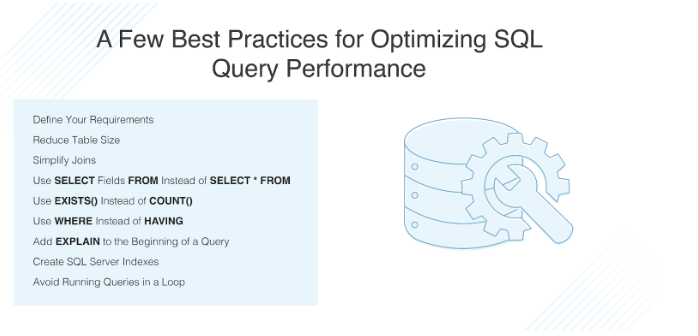
How To Speed Up SQL Queries?
The importance of speeding up SQL queries can greatly help to ensure that your websites and applications are available quickly, and that the customer experience is satisfactory. In order to improve query performance and speed up database queries, here are some tips that can help you.
The following are some key ways in which you can improve the speed and performance of your SQL queries.
1. Use column names instead of SELECT *
While using SELECT statements you should select only the columns you need in your result. Instead of using SELECT * from …, this will reduce the result size considerably and speed up your SQL query.
2. Avoid Nested Queries & Views
In the case of nesting a query/view within another query/view, you will experience many data returns for every single query, which results in your query slowing down significantly. In some cases, the database server may even time out and not return any information at all.
3. Use IN predicate while querying Indexed columns
In order to search for an indexed column, you should use an IN-list predicate rather than mathematical operators such as ‘=’ or logical operators such as AND/OR when querying the column. The IN predicate allows you to speed up your SQL queries, since the query optimizer sorts the IN-list in a way that matches the sort sequence of the INDEX, resulting in quicker results for your SQL queries.
4. Do pre-staging
You should create a separate table for the results of queries and procedures that join large tables. When you join tables ahead of time, the SQL queries that use their results work much faster.
5. Use temp tables
Furthermore, if you are joining a large table to a small table, you should create a temp table. This will contain only the data that is required for joining the large table to the smaller table. In order to do this, you can select data from a large table, transfer it to a temporary table, and join the small table to this temporary table.
6. Use CASE instead of UPDATE
The UPDATE statement takes longer to execute than a CASE statement due to the logging involved. A CASE statement, on the other hand, determines what needs to be updated and makes your SQL queries run faster as a result.
7. Avoid using GUID
The use of globally unique identifiers should be avoided since they can slow down the response time of your queries. Instead of using DATE, you can use IDENTITY.
8. Avoid using OR in JOINS
The JOINS process is time-consuming since your database needs to analyze each row in order to determine if it matches. If you also use an OR condition in a JOIN, your database will take twice as long to match the records if you also use an OR condition.You should use the IN operator instead of the OUT operator.



